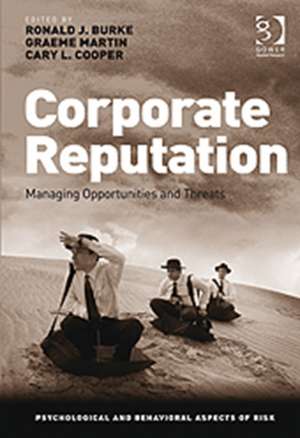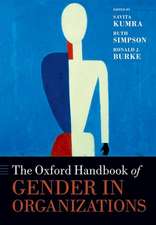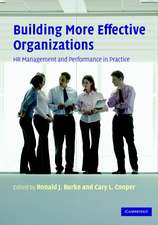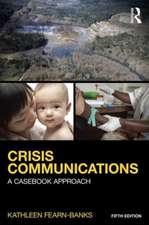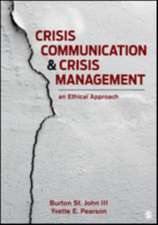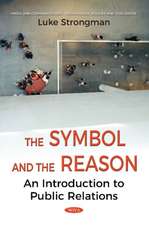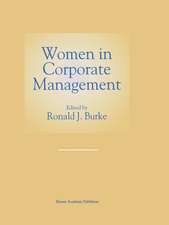Corporate Reputation: Managing Opportunities and Threats: Psychological and Behavioural Aspects of Risk
Autor Ronald J. Burke, Graeme Martinen Limba Engleză Hardback – 28 apr 2011
Preț: 825.21 lei
Preț vechi: 1143.59 lei
-28% Nou
Puncte Express: 1238
Preț estimativ în valută:
157.93€ • 164.27$ • 130.38£
157.93€ • 164.27$ • 130.38£
Carte tipărită la comandă
Livrare economică 14-28 aprilie
Preluare comenzi: 021 569.72.76
Specificații
ISBN-13: 9780566092053
ISBN-10: 0566092050
Pagini: 356
Dimensiuni: 174 x 246 x 29 mm
Greutate: 0.75 kg
Ediția:1
Editura: Taylor & Francis
Colecția Routledge
Seria Psychological and Behavioural Aspects of Risk
Locul publicării:Oxford, United Kingdom
ISBN-10: 0566092050
Pagini: 356
Dimensiuni: 174 x 246 x 29 mm
Greutate: 0.75 kg
Ediția:1
Editura: Taylor & Francis
Colecția Routledge
Seria Psychological and Behavioural Aspects of Risk
Locul publicării:Oxford, United Kingdom
Cuprins
Contents: Part I Importance of Corporate Reputation: Corporate reputations: development, maintenance, change and repair, Ronald J. Burke; The meaning and measurement of corporate reputation, Gary Davies; Measuring the impact of corporate reputation on stakeholder behavior, Manfred Schwaiger, Sascha Raithel, Richard Rinkenburger and Matthias Schloderer. Part II Developing a Corporate Reputation: Reputation and corporate social responsibility: a global view, Philip H. Mirvis; Organizational identity, corporate social performance and corporate reputation: their roles in creating organizational attractiveness, Kristin B. Backhaus. Part III Managing a Corporate Reputation: Employer branding, the psychological contract and the delicate art of expectation management and keeping promises, Kerry Grigg; Managing corporate reputations, strategic human resource management and negative capabilities, Graeme Martin, Paul Gollan and Kerry Grigg; From applause to notoriety: organizational reputation and corporate governance, Charles McMillan; The role of the CEO and leadership branding – credibility not celebrity, Julie Hodges; The role of the news media in corporate reputation management, Craig E. Carroll; The impact of Web 2.0 and Enterprise 2.0 on corporate reputation: benefits problems and prospects, Martin Reddington and Helen Francis; Re-creating reputation through authentic interaction: using social media to connect with individual stakeholders, Celia V. Harquail. Part IV Reputation Recovery: Corporate governance and corporate reputation: a disaster story, Thomas Clarke; Corporate rebranding, Dale Miller and Bill Merrilees; Repairing damages to reputations: a relational and behavioral perspective, Moonweon Rhee and Robin J. Hadwick; Index.
Notă biografică
One of Canada's most prolific researchers, Professor Ronald J. Burke's work has focused on the relationship between the work environment and individual and organizational health. He was Founding Editor of the Canadian Journal of Administrative Sciences and has served on editorial boards of more than a dozen journals. He has served as Director of the PhD Program at Schulich School of Business, York University, Toronto, and as Associate Dean for Research. Professor Burke is Professor Emeritus of Organizational Behavior at Schulich. He has published over 500 journal articles and edited or co-edited 27 books. Professor Graeme Martin is Director of the Centre for Reputation Management through People, he teaches and holds visiting appointments in Sweden, the USA, Italy, Columbia and Australia, is a member of the scientific committee of IDRAC in Lyon, and has been instrumental in establishing a Centre for Employer Branding and Reputation Management at Peking University with the University of Glasgow. Graeme has consulted with a number of private and public sector organizations in the UK, Sweden and Australia and is a member of a Scottish Government advisory panel on public services reform and human capital. He is widely published, including 4 books, and is currently editing a series on Advanced Human Resource Management Practice. Cary L. Cooper, CBE, is Distinguished Professor of Organizational Psychology and Health, Lancaster University Management School, England. He is a prolific author and is a frequent contributor to the national media. He is Founding Editor of the Journal of Organizational Behavior and Editor in Chief of the medical journal Stress & Health. He is past President of the British Academy of Management, a Companion of the Chartered Management Institute and a Fellow of the (American) Academy of Management. Professor Cooper is also the President of the Institute of Welfare Officers, President of ISMA, President of the British Association of Counselling and Psychotherapy, President of RELATE and Chair of the Academy of Social Sciences. In 2001, Cary was awarded a CBE by the Queen for his contribution to organizational health.
Descriere
According to Ernst & Young, the investment community believes that up to 50 per cent of a company's value is intangible - based mostly on corporate reputation. This book contains academic content along with practical contributions, developed by those serving as consultants or working in organizations specialising in corporate reputation and its management or recovery. Any book that is going to do justice to a subject that is so complex and intangible needs imagination, depth and range, and this is exactly what the contributors bring with them.
